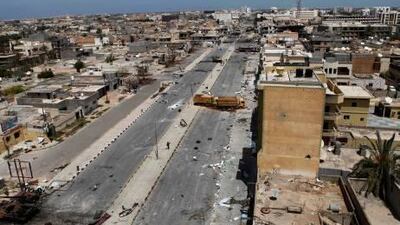At least four people were killed on Wednesday in an ISIL suicide bombing at the main court building in Libya's third-largest city Misrata.
General Mohammed Ghassri, a spokesman for the armed forces in Misrata that are loyal to the country's internationally-backed Government of National Accord (GNA) said three men had pulled up in a vehicle outside the court and one of them was able to push his way into the building, where he detonated his explosive vest.| According to a witness, the other two opened fie "at random" with Kalashnikovs.
One of them was shot dead and the other arrested after what the pro- GNA forces described on their Facebook page as a 20-minute exchange of fire.
The same witness, who asked not to be named, said, "Shooting could be had all over the city centre after the attack." He said he believed the attackers had used rocket-propelled grenades.
Thirty-nine people were injured and taken to Misrata's main hospital.
The United Nations Support Mission in Libya (UNSMIL) immediately condemned the attack. The UN special envoy to Libya, Ghassan Salame took to Twitter, saying, "Indiscriminate attacks on civilians incl. employees of judicial institutions violate human rights law."
The attack coincided with the arrival of ISIL detainees for a court hearing, Libyan news agency LANA reported. ISIL claimed responsibility for the attack in a message issued by its propaganda unit Amaq.
Misrata, a large commercial port about 190km east of Tripoli, is one of Libya's major military power base. Its powerful and well-armed forces formed the backbone of an offensive that drove ISIL from the coastal city of Sirte last December but Misrata itself has been largely immune from armed clashes and attacks in recent years.
The December offensive was backed by the GNA, one of two main rival governments that emerged from the chaos following the 2011 ousting of long-time strongman Muammar Qaddafi. But ISIL remains a force in Libya despite losing Sirte, after which many of its fighters redeployed to the vast and lawless desert south.
The US military last month carried out a wave of air strikes on ISIL in Libya, reporting 17 people killed on September 22 at a desert camp 240 kilometres southeast of Sirte. US Africa command said the camp was used to move jihadists in and out of the country, store weapons and plot attacks.
In August, ISIL claimed responsibility for an attack in which 11 people were beheaded at a checkpoint manned by forces loyal to military strongman Field Marshall Khalifa Haftar. Nine soldiers and two civilians were killed in that attack in the Al Jufra region about 500 kilometres south of Tripoli.
Field Marshall Haftar supports an eastern-based administration that is the rival to the GNA and controls more territory than any other Libyan leader, as well as some major oil facilities. A group calling themselves the Popular Authorization Movement for Saving the Country wants to propel him to Tripoli, to replace the rudderless United Nations-backed government of Prime Minister Fayez Al Serraj. The group claims it has collected 700,000 signatures supporting a Haftar-led government.
Libya’s fractured and militarised landscape means it is unlikely that Field Marshall Haftar mcan take the country by force, even with the support of allies Egypt and Russia. The campaign is seen as a " soft coup" - a means of giving the controversial strongman popular legitimacy before Mr Serraj’s mandate expires in December and at a time when the UN is starting out on a new peace plan and ISIL is making a comeback less than a year after suffering heavy defeats.
The UN process, which veteran Lebanese politician Ghassan Salame took over in June, was supposed to heal divisions. But thorny decisions such as who would lead the army were left up in the air. Mr Serraj was plucked from obscurity but hope soon faded as his low-key style failed to impress.
According to a western diplomat, Libyans mostly hold the view that the peace agreement made things worse.

